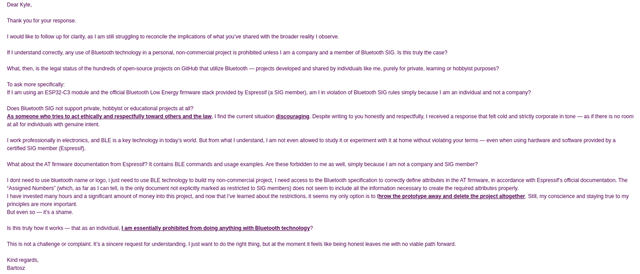While working on a device for personal use, I needed to reference some official BLE documentation. I noticed that many of the documents — including:
…contain a notice like this:
"Use of this specification by anyone who is not a member of Bluetooth SIG is
prohibited and is an infringement of the intellectual property rights of Bluetooth
SIG and its members. The furnishing of this specification does not grant any
license to any intellectual property of Bluetooth SIG or its members."
Interestingly, documents like [Assigned Numbers (link)] do not contain this restriction.
That raised a red flag for me. I understand I’m not allowed to use the Bluetooth name or logo, and that seems totally fair. But since this is a private, non-commercial project, I cannot become a SIG member — especially considering that membership isn’t even available for individuals or sole proprietorships.
But here’s the confusing part: even if I use a chip that comes with a vendor-supplied Bluetooth stack (like nRF, ESP32, STM32WB, etc.), and even when the chip vendor and stack maintainer is a Bluetooth SIG member, it appears I’m still violating the terms and feel like I’m doing something illegal just by building a BLE-based prototype at home.
So I decided to ask directly and sent an email to Bluetooth SIG. Honestly, I didn’t expect a reply — but they did respond.
For clarity: I know there are thousands of open-source BLE projects out there, and I’m not expecting to be “hunted down” for this. This is not about avoiding consequences — it’s about doing the right thing. I respect intellectual property, and I want to make sure I act within the rules.
But if I understood their response correctly, unless I’m employed by a company that’s a SIG member and officially developing a qualified product, I have no legal right to even reference the specification, much less develop or test a BLE application at home — even if it’s just for learning or private use.
Am I misunderstanding something?
Or is this really how the rules are written?
I'm not a lawyer, and I'm not using formal legal language — so it's entirely possible that I've misunderstood something here. But as someone who tries to act ethically and stay within the rules, I'm trying to make sure I really understand what those rules are.
If I'm wrong — please correct me. I want to be wrong on this.
Any insight would be truly appreciated.
Me:
Response from SIG:
Me:
Response from SIG:
That was about as cynical and dismissive as it gets.
formal form of:
"We won't answer your questions. We won't clear up your doubts. Do whatever you want – but if anything happens, you're fu***d."


